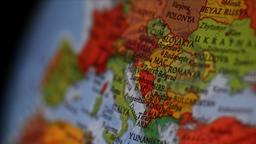Turkey carried out fundamental policy reforms in the 1980s. First we abolished gasoline subsidies. Then we opened our economy to the outside world. We exported $3bn worth of goods and services in 1980; now the figure has risen to $130bn. 90 percent of the $3bn exports in 1980 were agricultural produce. Since the 1990s, the manufacturing industry has constituted 90 percent of Turkey’s exports. All this happened, but meanwhile the share of hi-tech products within Turkey’s total exports sadly could not exceed some 2 percent. Why? Because Turkey failed to become a country hosting part of the global value chains, obviously. There are no foreign investments flowing to Turkey with this purpose.
Let me draw your attention to Figure 1 first. This indicates the share of hi-tech exports within the total exports of a series of countries. Turkey stands on the far right, somewhere between Pakistan and Nigeria, whereas at the far left are Singapore, Malaysia, China and Korea. Even in Indonesia, which is only just carrying out the reforms that we made in the 1980s, the rate stands around 7 percent. In 2012, Korea exported $120bn, Malaysia $60bn, Poland $10bn, and Indonesia $5bn worth of hi-tech products. Turkey stands at $2bn. Where does the difference come from? All these countries host part of global value chains; Turkey does not. At this point we have to ask: Why don’t companies forming global value chains choose Turkey?
First you can grumble. Then you can go further and blame them, whoever they are, out loud, but at the end of the day, you cannot fight a reality. There are two pictures in my mind about this, which I believe are mirror images of one another. The mirror image of the question why companies forming global value chains do not choose Turkey is, I believe, the question why Turkey has no companies that can compete on the global scale. Why don’t you sit back and start listing the Turkish companies that come to mind when we speak of competing abroad. TAV occupies the top rank on my list. It builds and operates airports everywhere. I can count a few construction companies that can stay afloat in cutthroat competition as well. Do we have any companies in the manufacturing sector that make such an impression though? In my opinion, we more or less do not have a single company that operates globally in this field. Perhaps Ülker with its latest investments. I was talking recently to the manager of a company from Turkey that invested abroad. What he said coincided with the findings of TEPAV economists. Turkish investments flowing abroad do not go to a better investment climate than that in Turkey. Our companies can in fact usually survive in countries where competition remains low because the investment climate is poor. Highly competitive companies do not enter that market, and hence our guys can do business there. If things normalize in the future, say, if Russia gets a market economy, consider how things could work out.
If you lack domestic companies that are accustomed to producing in a milieu of cutthroat competition in your own country, your country naturally fails to be an adequately productive alternative for companies that form global value chains. Strong companies bring along the investment of strong companies. Consider the HAVELSAN and TAİ experiences. Why can’t the high technology that comes with offset deals spill over outside these companies? Why can’t hi-tech products with the chance of global competition be produced? I’m not talking about producing junk; I’m talking about a product preferable to those produced in any other country in the world. What should we aim for under the title “national technology”? Projects that can boost the share of hi-tech products in Turkey’s exports, of course. How will that come about? Obviously, with foreign companies. You can’t have high technology without foreign investments.
The 20th century was an era when products went across borders. In order to cope with that era, we set up the World Trade Organization. The 21st century, on the other hand, has been an era when factories go across borders. Therefore, the multilateral negotiations carried out within the scope of the World Trade Organization failed to suffice for the aimed outcomes. This is how and why the Transatlantic Trade and Investment Partnership (TTIP) and the Trans-Pacific Partnership (TPP) came about.
Let’s say then that the first reason is the lack of local companies with high competitiveness. So what else? Why don’t foreigners come here to set up global value chains? First, we should get this straight: Our education system fails to train individuals with the necessary qualifications for hi-tech exports. There is a constraint at stake. Then, our judiciary system appears to be designed not to solve but just to drag out disputes. Third, the principle of equality under the law, the fundamental indicator of the rule of law, doesn’t function properly in Turkey. Add on top of all these the outlook of our wider region and come up with a candid answer: If you were in the shoes of a foreign company, would you come here to set up a global value chain? We are talking about a country that has difficulty in bringing raw materials from the İzmit Gulf to Gaziantep for carpet production. Give me a break.
When I consider this list, frankly I think it will not be hard at all to maintain Turkey’s position as an oasis of stability in this region.
Figure 1. The share of hi-tech products among all manufacturing sector exports, selected countries, %, 2012
Source: World Bank, World Development Indicators





